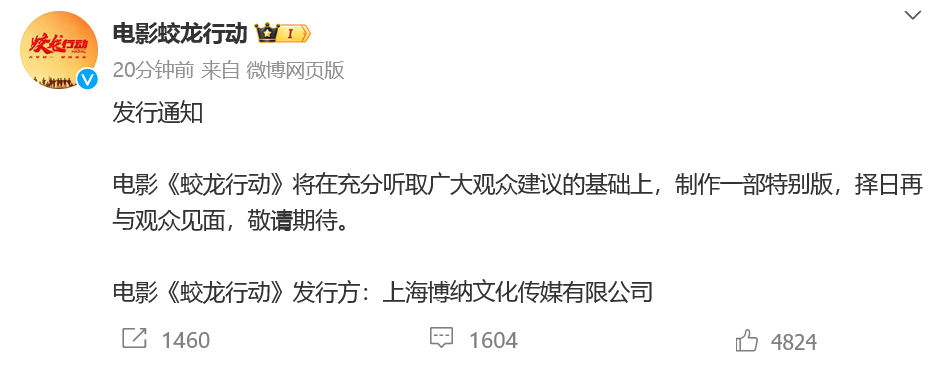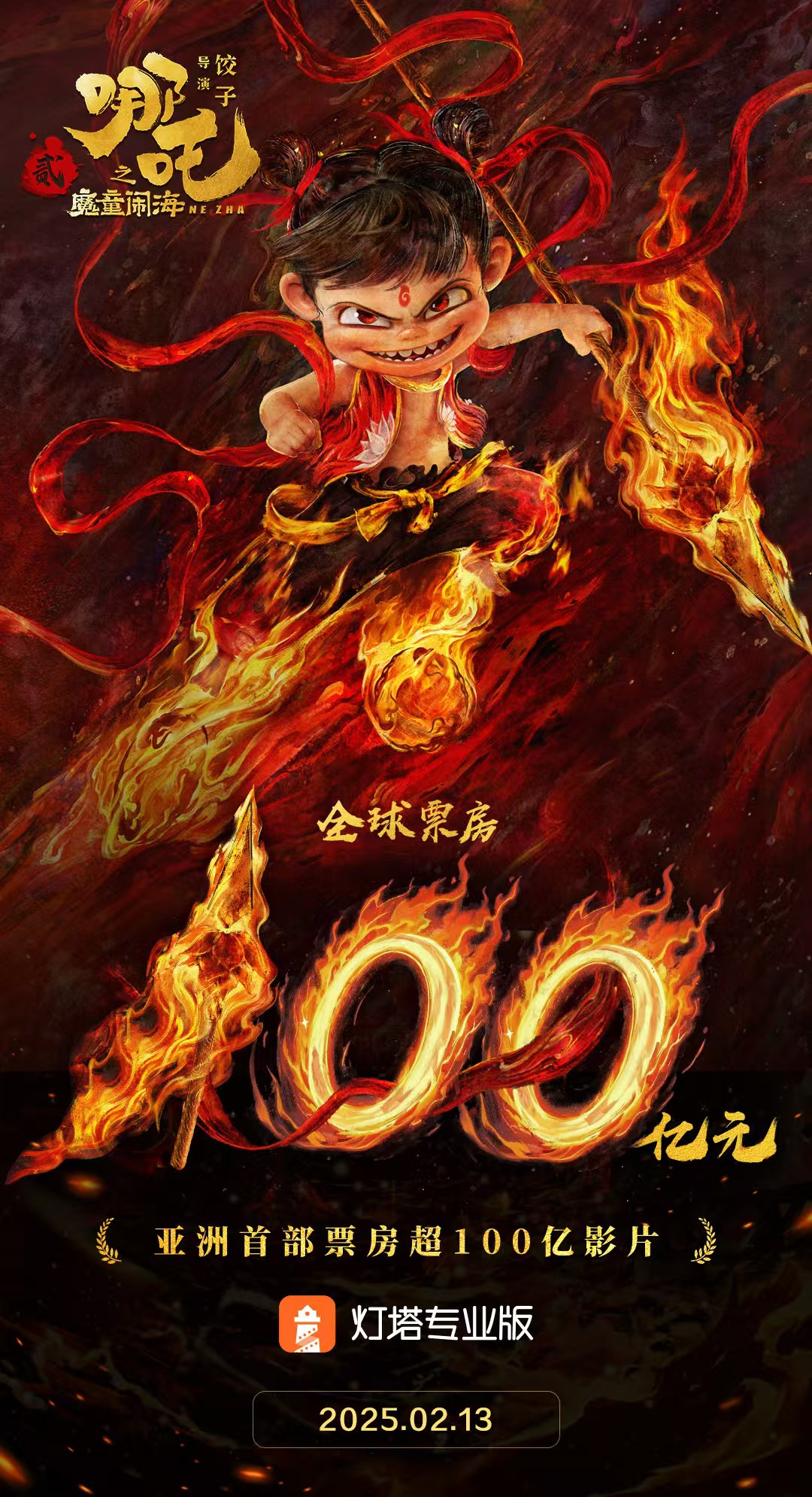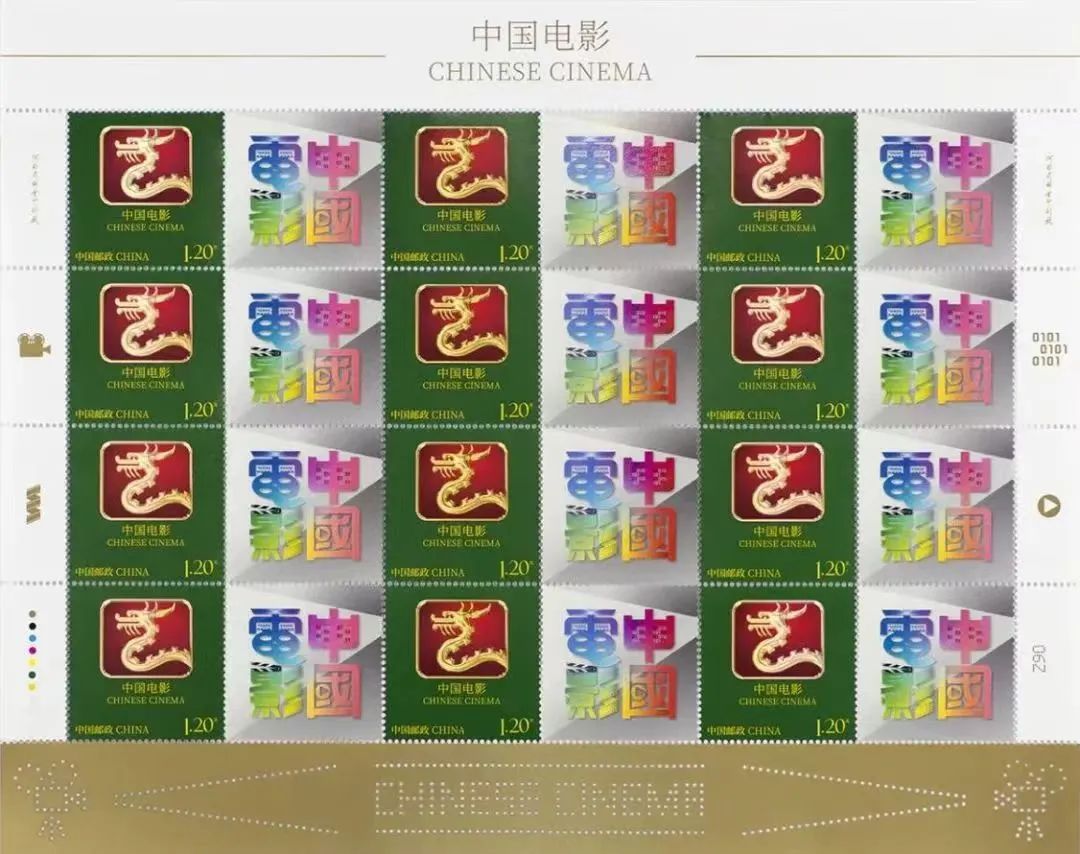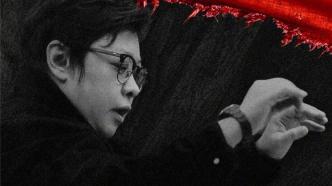
As of January 31, the box office of Zhang Yimou's new film "Manjianghong" has exceeded 3.4 billion, gradually opening up the gap with other films, and firmly sitting on the championship of the Spring Festival movie. It has also become the highest-grossing film directed by Zhang Yimou. In addition to the witty and exciting movie plot in the film, its magical and brainwashing "electronic music + Henan opera" soundtrack has also been noticed and discussed by more and more audiences. The soundtrack and composer of the whole movie is Han Hong, who is somewhat surprising.
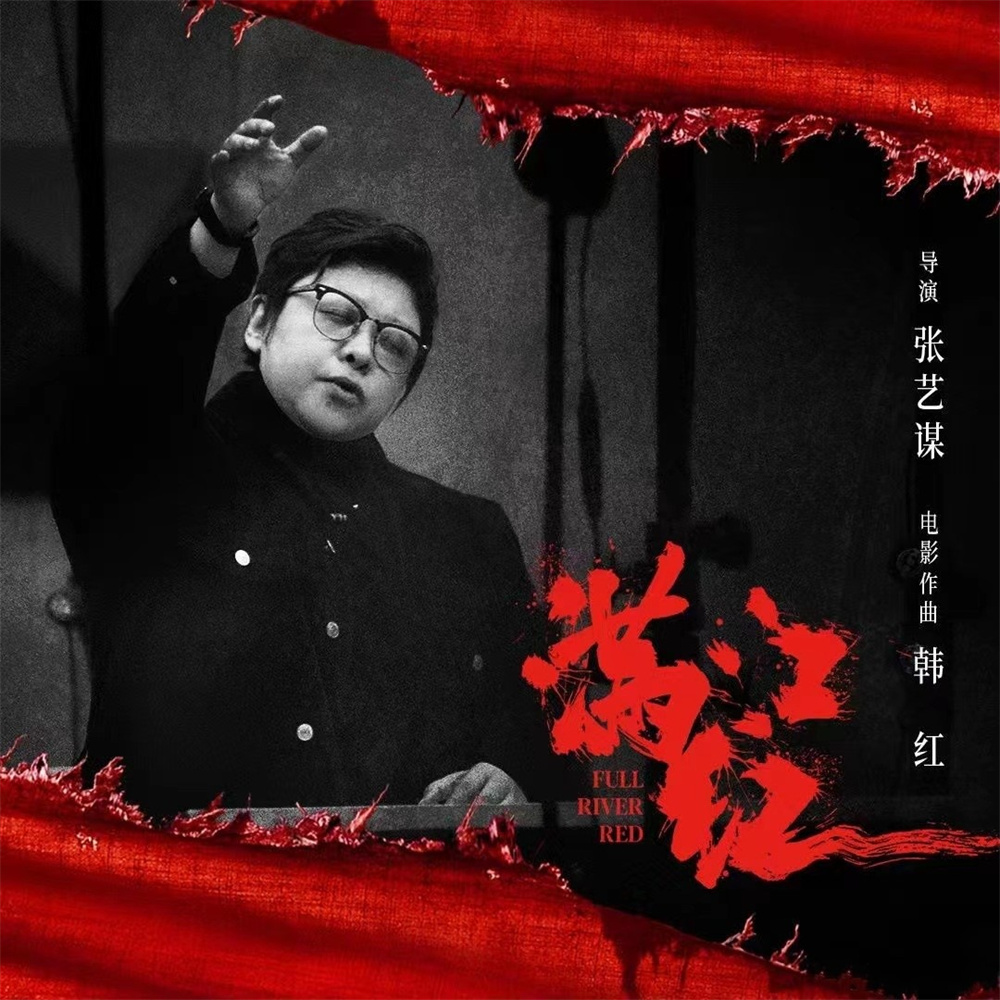
Han Hong
In April last year, Han Hong launched her first collection of classical instrumental music "Morning Fog". At the release ceremony, Zhang Yimou was invited as a guest to listen to it. At that time, there were other big names in the film and television industry present. "I can write the soundtrack for you!"
A month later, she received a letter from director Zhang Yimou, inviting her to compose music for the new film "Man Jianghong". The way of "Flying Pigeon Passing Letters" is retro and close to a certain "sense of ritual" in the era of the movie. The two actually completed the creation of a movie soundtrack in the communication of letters.
The first time she got the script of "Manjianghong", Han Hong cried. "Heroes made me cry and shocked me. They are all small people, and they could have lived their own lives, but for the four words 'serve the country with loyalty', they gave up their lives." Han Hong, who was born in a military family, once wore a military uniform , Although he has retired from the army, "many traditions in the military camp remain in my blood. When I read the script, the melody of "Manjianghong" flowed directly from my mind."
Han Hong, who was doing film soundtrack for the first time, didn't even know what kind of process film soundtrack should follow, "I don't know what other film soundtracks are like. Anyway, when I read the script, it's like 'making a movie' in my mind. , Imagining the picture, the melody will naturally appear, all you need to do is record them.”
Various emergencies were encountered during the period. For example, the music team was isolated in different places such as Guiyang, Chengdu, Zhengzhou, and Shanghai. "But we were the first to 'hand over work', and we didn't miss an hour." Han Hong talked about the debut of the film soundtrack, quite proud of it.

Han Hong
The background of the story of "Man Jianghong" took place in the Southern Song Dynasty. The film incorporates national instrumental music such as Qin, Zheng, Xiao, 筚篥, Sheng, and Suona. With the atmosphere and desolation of the ancient city buildings in Shanxi, the reverberations spanning thousands of years slowly unfold the historical scroll. , both audiovisually and fully embodies the oriental aesthetic taste in Zhang Yimou's films. From comic banter to suspense that is constantly reversing, national percussion instruments such as small boring gongs and Chinese drums are integrated with the unique charm of Chinese opera, breaking through the humorous expressions of the characters, and extracting a secret that can be "heard" " clues.
The most distinctive feature is that the characters in the film quickly travel through the corridors over and over again as the plot progresses, and the Henan opera arias that coincide with the characters' psychology or the progress of events. On the way Zhang Da and Sun Jun went to the lower courtyard to find Liu Xi, in "Exploring the Yin Mountain", "What did you say that Liu Jinchan's soul flew away, old man, I don't believe you made up lies" hinted at the development direction of the plot; On the road where the adults are, the excerpts of "Ten Security Officers" from "Xia Chenzhou" sounded, which is intriguing after thinking about it; It’s like Qilang and Eight Tigers going to Songying”; on the way Yaoqin went to meet Qin Hui by breaking his promise and looking for an opportunity to assassinate him, in “Mu Guiying in Command”, “The three cannons outside the gate were like thunder, and I walked out of Tianbo’s mansion to protect the country.” The heroine's name is corrected... In the rhythm of the high-pitched, sonorous electronic music, these far-reaching librettos seamlessly participate in the narrative and performance, which is a refreshing audio-visual expression.
Zhang Yimou initially proposed to Han Hong that he hoped to use more opera elements in the film soundtrack. Most of the Yue family soldiers are from Henan, and Han Hong said, "Then come to Henan Opera." The director wanted "Henan Opera Rock", and even specifically asked her, "Don't rap". He knew that Han Hong had played hard these years, so he gave himself a new stage name "XXXL". After several times of "like two big children arguing", Han Hong finally insisted on using the combination of "electronic music + Henan opera" in the movie. Leave your own strong and unique imprint in it.
"A tragic song, parting and reuniting for a lifetime, all turned into mountains and rivers." The ending song is called "Wang", written and sung by Han Hong. The lyrical style combined with the majestic lyrics sublimates the power conveyed by the entire song and sublimates the theme of the movie to reach people's hearts. Han Hong didn't sign the song when she gave it to Zhang Yimou for the first time. Zhang Yimou once thought that the songwriter was Fang Wenshan. "I said no, it's me. He opened his eyes wide again." Han Hong was a little proud of the surprise she brought to others.
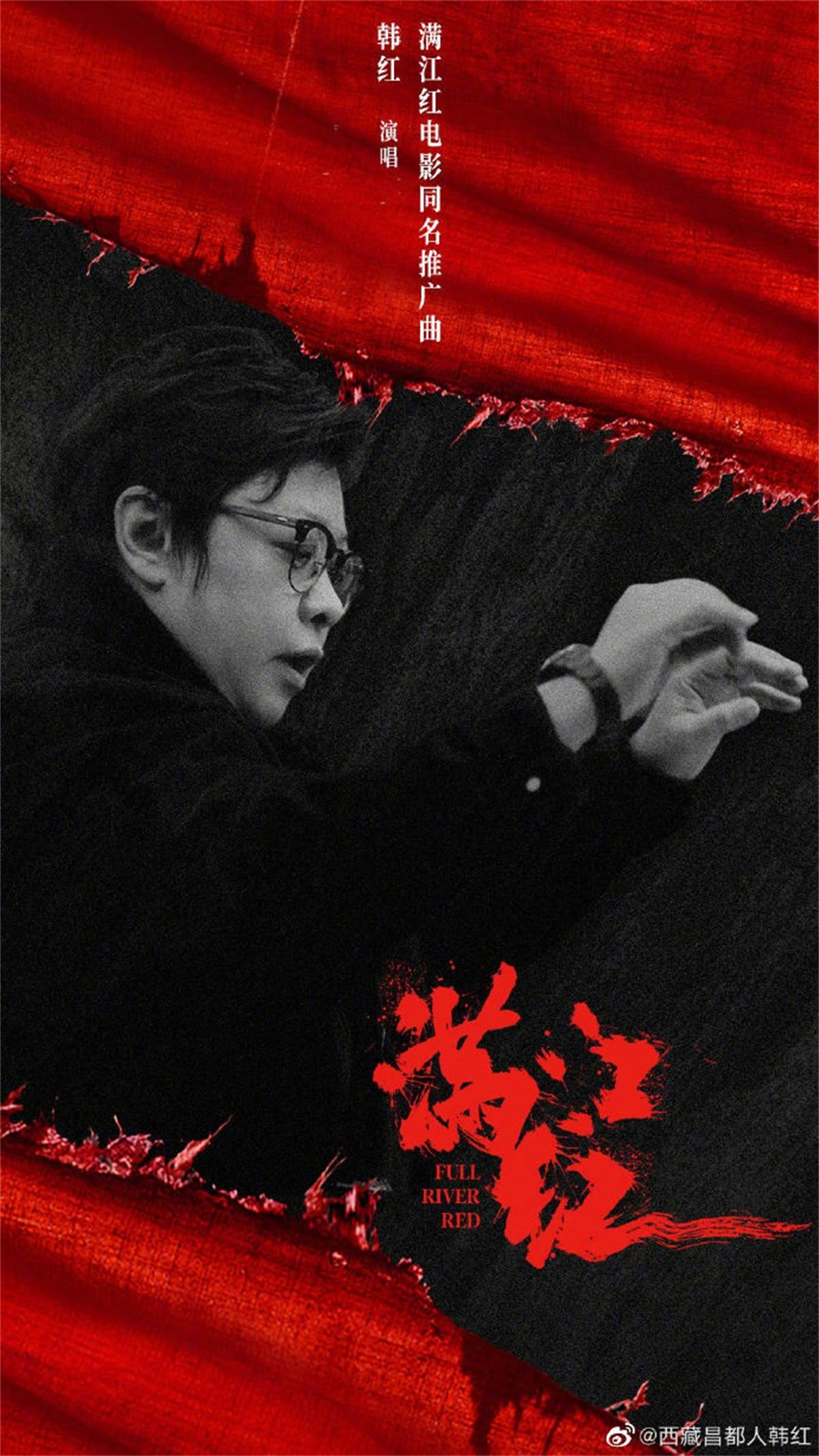
promotional song poster
Han Hong, who has a clear and high-pitched voice in my memory, has a series of well-known masterpieces such as "Qinghai-Tibet Plateau", "The Road to Heaven" and "Dawn", and is a popular "big sister" in the Chinese music scene. Her domineering speech and behavior style, her spare no efforts in public welfare and even her "deeds" that offended people were all her distinctive labels. In recent years, Han Hong has not shown much. Although she still has music works, she often feels "unsuitable" in the era when online slang songs are prevalent. More often, her identity is mentioned around the foundation's public welfare undertakings.
"I'm a little cramped. I haven't been interviewed for six years." This was Han Hong's opening remarks when she was interviewed by The Paper. Starting from this "tightness", Han Hong analyzed in detail each of her "cautious tricks" hidden in the film soundtrack, as well as a music obsessed and talented person who once became popular and broke through her comfort zone again, constantly expanding her creative boundaries. The mental journey of a "soundtrack newcomer" who is still chasing his inner dream.
At the age of 17, Han Hong applied for the Composition Department of the Central Conservatory of Music. During the interview, the teacher asked her, "Have you ever learned staff?" "Have you ever learned solfeggio?" "Do you have any small works composed by yourself?" After receiving a series of "no" answers, the teacher asked "Then what are you doing here?" ?” Han Hong said, “I said I can learn to compose. I have good pitch, good ears, and can listen to harmony.” The teacher asked her why she didn’t learn the piano, and Han Hong replied, “My family is too poor to afford a piano.” The teacher Asked, "What else do you have?" Han Hong said, "I can sing." In this way, Han Hong entered the Vocal Music Department of the China Conservatory of Music. "But in fact, I have always lived with a piano in my heart. I don't want to be too modest, but I have to say that maybe I do have some small talents in composition."
In those years when she was a pop singer, Han Hong hardly read the staves, let alone the complicated and grand symphony scores. In the creation of serious music, she is like a child who has just learned music, counting the lines on the staff to fill in the notes. A few years ago, she took the composer Tan Dun and conductor Li Xincao as her teachers. This unfulfilled dream of adolescence was gradually written by her in person.
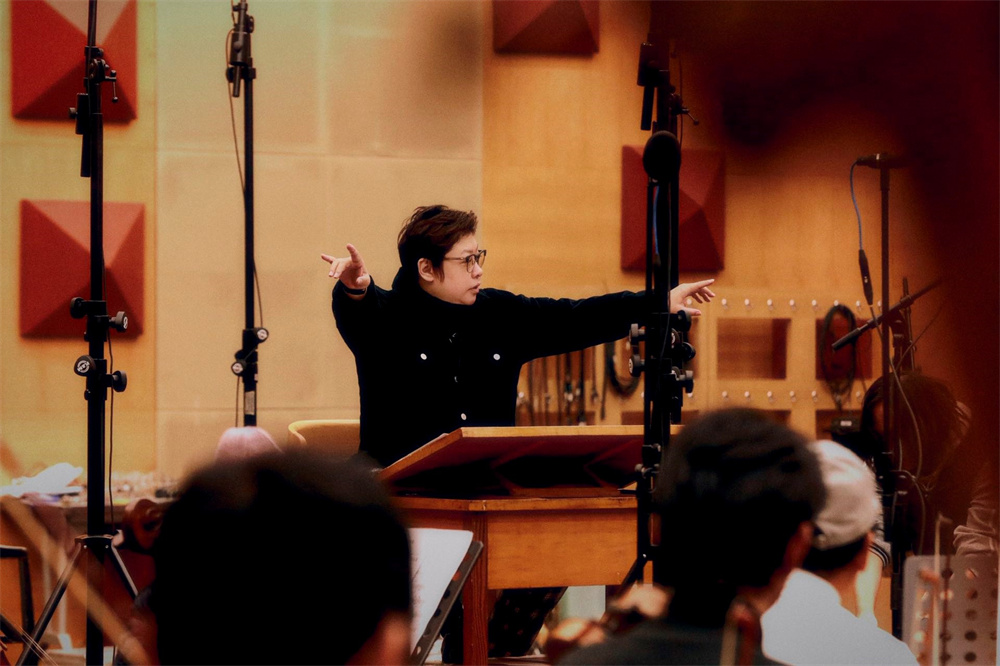
Han Hong
Talking about rising, Han Hong still couldn't hide her domineering and ambition in her words, "I hope I can be like my master Tan Dun, and get a little golden man for Chinese film music!" When she was young, Han Hong yearned for Grace Beautiful stage, aspire to become a truly international star like Michael Jackson and Celine Dion. In 2017, Han Hong, who created and directed a musical for the first time, was invited to walk on the red carpet of the Tony Awards, which is still an achievement she feels a little proud of. "I think that a person must have the courage to set goals for himself. No matter how old you are, you can hang the word ideal high above your head, so that you will be full of strength."
【dialogue】
When reading the script, the melody flows naturally
The Paper : What is the process of film soundtrack? What are the excitements?
Han Hong : "Manjianghong" is my first film soundtrack work. From May 2022, I will get the script. During the whole process, director Zhang Yimou and I exchanged letters to discuss this creation. After reading the script for the first time in May, it took 7 months to complete the writing, recording, post-mixing and screen alignment of the entire soundtrack of "Man Jianghong".
I cried while reading the script, a lot of the music just flows out of the reading, you just have to record it. I've been writing blind music since I read the script. At that time, the director hadn't finished filming, but in my heart, I had already filmed "Man Jianghong" 4 times. Thankfully, what I wrote was almost identical to what the director shot.
"Man Jianghong" is a story of praising unknown juniors, praising ordinary people, and praising heroes. Another layer is the four words "serve the country with allegiance". I am a soldier, which is very touching to me.
The Paper : What did the director ask of you? I saw that it was mentioned at the event that this time the composing was "confidence hit", can you introduce the ups and downs in this process?
Han Hong : The director's requirements are constantly changing, because the soundtrack needs to be based on the processing of the shots and pictures after he shoots back, so the music must follow the development of the movie's plot. At the beginning, he said whether our play can be a little drama. I am more worried that it will become "Three Shots Surprise", and I don't want to be the same as the music of director Zhang Yimou's previous works. This time I want to "break the ice" for the film directed by Yimou. His usual music foreshadowing does not participate in most of the narration. This time I want to participate more in narration and development. I think the soundtrack of a movie is the electrocardiogram of a movie. The electrocardiogram has highs and lows, and there are gentle and high tides. The soundtrack of the movie is also ups and downs, slowing down and rushing up again.
The director told me that Yue Jiajun was from Henan. At that time, the first idea popped up: If Henan opera and electronic music cooperate, what kind of collision will it be? But at first he didn't buy into the idea. He thought my electronic sounds were too loud, so he used the original electronic sounds later.
I have never been afraid of him. He has a small canine tooth when he smiles, which is very cute. But after I became the composer of his films, he became very serious and rarely laughed. At first I thought why are you like this, we are very good friends. Then I became a little "rebellious", thinking you "hit" me, right? I have to write it for you.
As a result, I wrote more than 90 pieces of music and discarded 27 paragraphs. I wrote 31 editions of the song "Cherry Song" and discarded 30 editions. The director wanted "Cherry Song" to have an ancient flavor, but also wanted it to be popular. This requirement itself is contradictory. How can ancient songs in the past be popular? So the two of us came over with such "noisy".
It turns out that in music, I am confident and I am my own master, but I suddenly found that as a soundtrack for a movie, no matter you are Morricone or Hans Zimmer, it must serve the story, consider the plot, The lines cannot cover up the lines, and the music cannot be robbed. Traditional film music serves the film and cannot express too much individuality. But "Man Jianghong" still has individual expression. I am very grateful to the director, and I am still "used" to it. Of course, the process of being "struck" is quite exciting.

On January 7, 2023, the final mix of the soundtrack of the movie "Manjianghong"
I used music to participate in the advancement of the story
The Paper : We heard a lot of national instrumental music and opera singing in the movie. How did you find the right voice for this story and the characters in it?
Han Hong : The story happened in Yue Fei's time. The music in the Southern Song Dynasty was not called music, but "Yueyin". I have always loved and admired Chinese folk music, so this time I used Chinese folk instruments such as Zheng, Xiao, Qin, Dizi, 筚篥, Sheng, Suona, Xiaoboring Gong, and Chinese drums. Why should I use them? ? Because this is a story about Chinese people, the director shoots it for Chinese people, and the music is written for Chinese people. Chinese people have representative music, and I want to use the language of this music.
There are some timbres in folk music that are very representative. For example, in the scene where the heroes were buried collectively at the end, I insisted on using suona 100% of the time. I now regret that I should get 10 or 20 pieces. Using the suona to praise the hero's spirit of immortality and devotion to the country will resonate with the Chinese. Moreover, this suona is also particularly in line with Zhang Yimou's temperament of a Shaanxi man and a Northwest man.

soundtrack diary
The Paper : When integrating ancient, modern, Chinese and Western elements together, which parts are more "struggling"?
Han Hong : The combination of Henan opera and electronic music is extremely difficult. Because the traditional Henan opera is relatively slow, it can't get into the drum beat. We found a large number of older Henan opera actors, many of whom are very well-known Henan opera performers, who couldn't sing when they heard the drumbeat or electronic music. Moreover, the slower the Henan opera, the more interesting it is. Ours is good. It is all in the rhythm. It is quite difficult to conform to the fast walking in the corridor.
But walking along the corridor is a very iconic and important passage in this movie. The director said that you have to let your music follow the footsteps of officers and soldiers to really walk quickly. It is necessary to combine breathing and footsteps, so the rhythm must be fast, and this part is also very strenuous. The Chinese big drum I used at the beginning was rejected by the director. Later, I used small boring gongs and small bang drums, and the sound was crackling... The director was satisfied. He thought it had a sense of urgency and was very operatic at the same time.
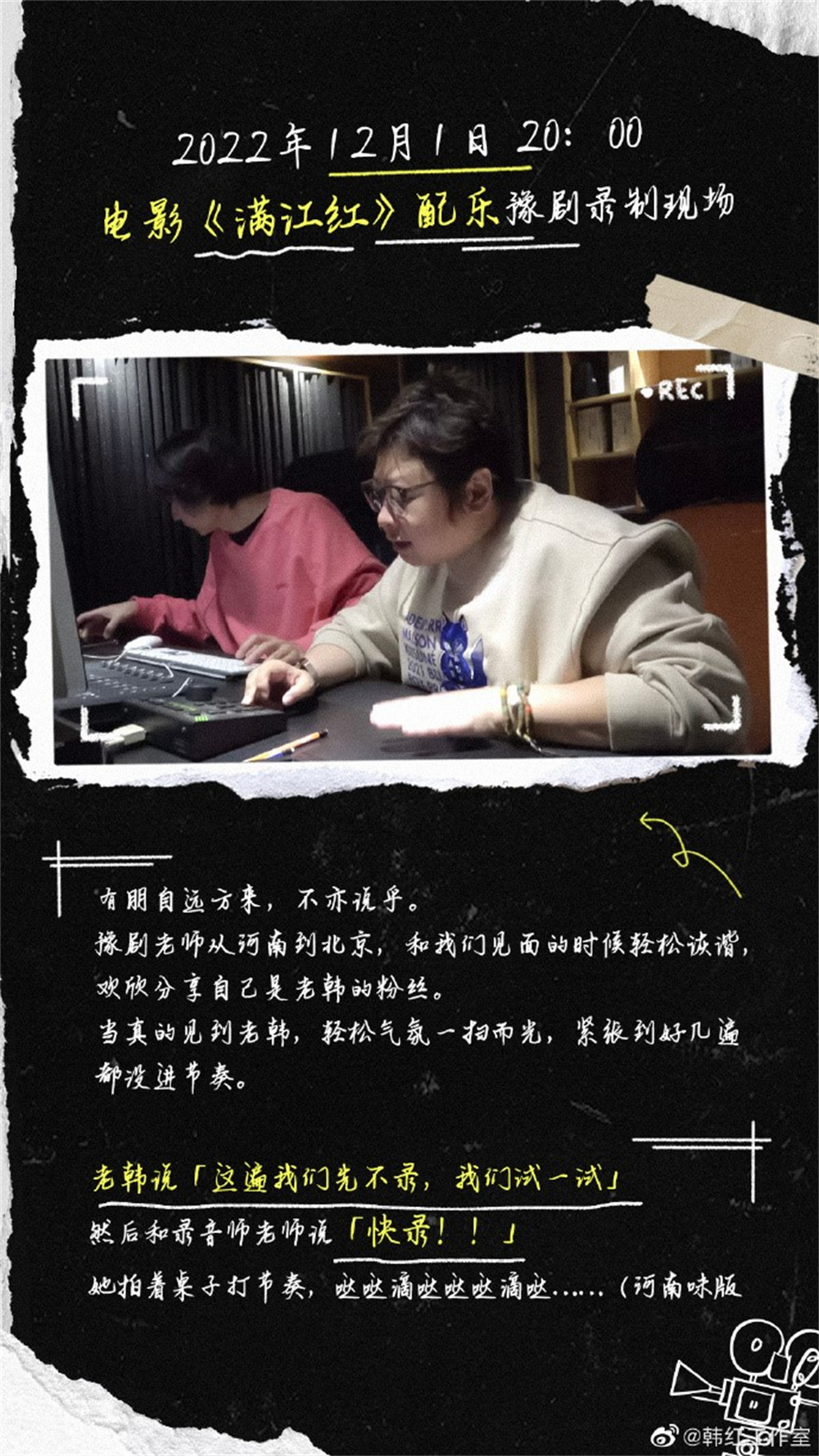
soundtrack diary
The Paper : Many viewers find this part very interesting. They can vaguely feel that there is a comparison and connection between the lyrics and the content of the movie, but because it is too fast and they cannot be heard clearly, how did you think about it when designing it?
Han Hong : First of all, the director didn't intend to let everyone understand the libretto, so the rush of the officers and soldiers was reflected in the corridor. The camera specially shot the feet of the officers and soldiers, just to be quick.
Some opera directors provided me with some, and we did some homework later to find more materials. The director wanted some old lyrics from Henan Opera, and if you don’t want to adapt them, you need the original lyrics. It doesn’t matter if you understand it or not. Now the one selected is like "Ten Security Officers", corresponding to Mr. Wu played by Yue Yunpeng, with a sense of irony and black humor. Another example is "Mu Guiying in Command" before Yaoqin's assassination. I put it in that position because I think Yaoqin is Mu Guiying in my heart. While this scene is going to assassinate Qin Hui, it is also her farewell scene. When I wrote this piece of music, I named it "Heroine".
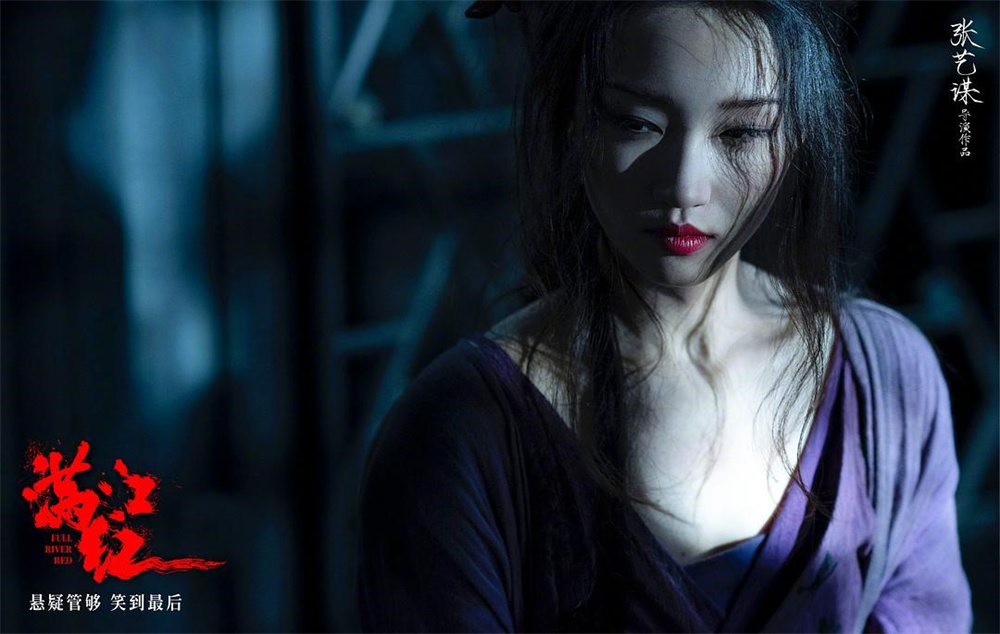
Wang Jiayi as Yaoqin
The Paper : The movie has a suspenseful line to solve the case. Does the music design provide some clues?
Han Hong : Director Yimou followed his logic and told me which part he wanted to be more suspenseful. Then I will start from the sound effect and choose the tone to strengthen the feeling he wants. For example, in the suspenseful part of the case, I used many kinds of sounds by jumping wires (when doing MIDI, we compressed and mixed many kinds of sounds) as a combined sound.
In addition, the relationship between Zhang Da and Sun Jun in the film is more complicated. It is a relationship between superiors and subordinates. Sun Jun was brought up by Zhang Da's mother since he was a child. There are many emotional flows between them. So we have a piece of music played by 筚篥 and Xiao. Whenever Sun Jun and Zhang Da are together, this theme music will appear, that is, we have specially formulated a representative melody for our two male protagonists.

Sun Jun and Zhang Da
There is another scene where after Liu Xi died, Zhang Da wailed, "Third Uncle, I can't do this anymore." In the crying, one was crying for his comrades-in-arms, and the other was crying for himself, giving himself determination and concentration. The melodious voice here There is a kind of pain and desolation; there is a kind of sadness and freedom in Xiao. The 筚篥 must represent Zhang Da, Xiao is Liu Xi, Ding Sanwang, Yaoqin...the chivalrous men who have not completed their tasks.
In addition, in some places, the sound of some guqin and guzheng can be faintly heard, and the sound of the piano is the prefix of farewell. In this play, I did let the music participate in a certain story advancement. I hope that after hearing my drumbeat, others will have a sense of urgency, and have a guess about what will happen next, or an extradition.
The Paper : The passage of "The whole army recites "Manjianghong"" made many people cry while watching the movie, and the music also played a great role in promoting emotions. Let's talk about the process of writing this climactic scene how is it
Han Hong : The entire army recited the passage "Manjianghong", which I wrote relatively early. The first melody I wrote was the theme melody for Sun Jun and Zhang Da; this is the second. I have read the script countless times. When I read this passage, I burst into tears just reading the text.
Three beats are used here. I am a soldier, and the army will make that kind of "欻欻" sound when they are marching. Raising legs, kicking goose steps, and soldiers marching are all rhythmic, and there must be that sense of strength. So thousands of people are repeating Qin Hui's words, "Peng's unique strokes, to show his heart, full of Jianghong", this rhythm appeared in my heart, if it is four-four beats or four-two beats, it doesn't feel right. Some of the iconic things of a soldier are on me-stepping in step, obeying orders, and having the world in mind. It is such a feeling, this piece of music flows naturally in my heart. I cried when I wrote it. I was particularly shocked by the sincerity to the country and the determination to serve the country with all my heart. It seems that I can't explain these things clearly, that complex is in my bones and blood.
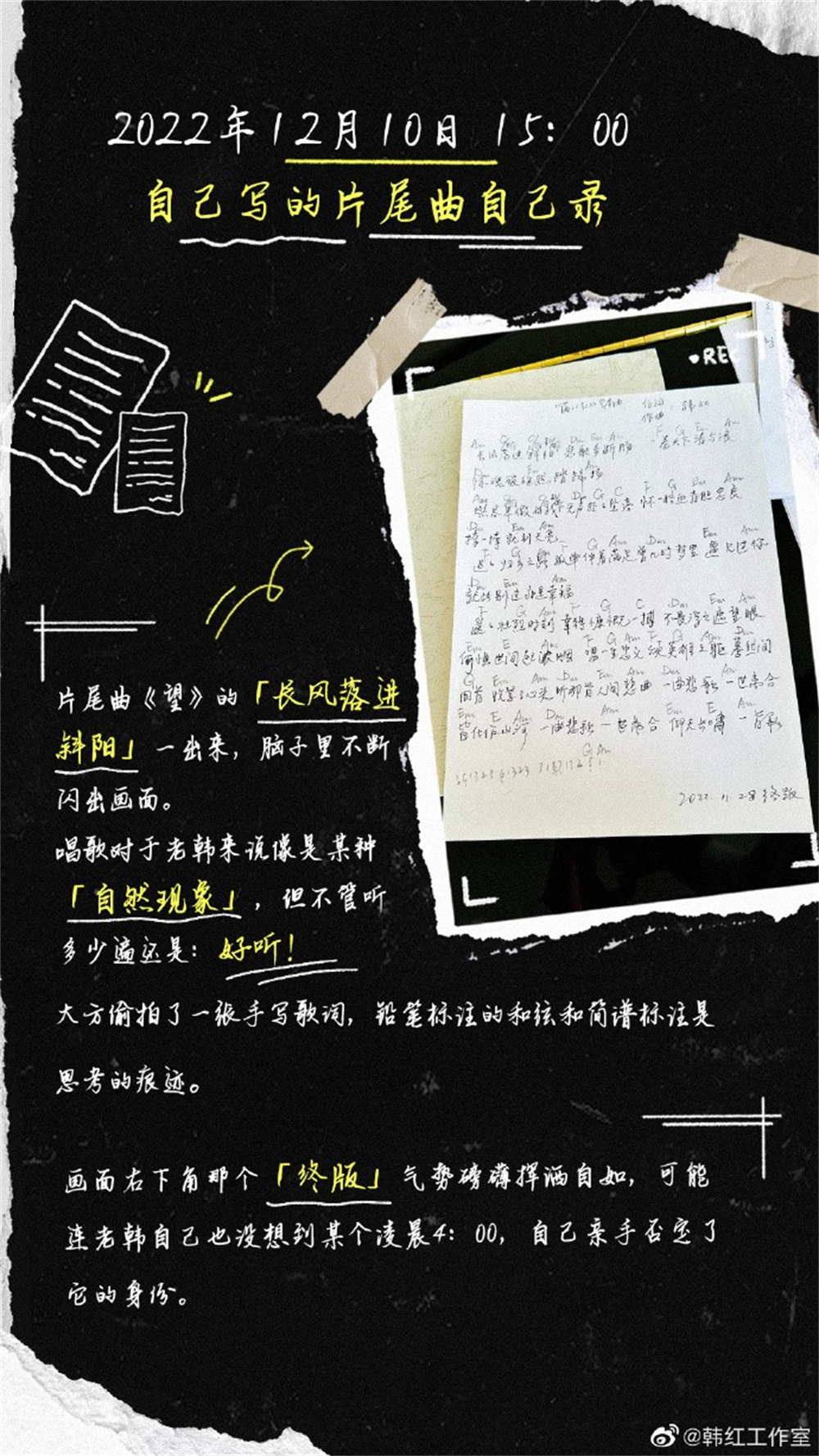
soundtrack diary
The Paper : The ending song "Wang" is a complete song. You took care of all the lyrics and music. Can you talk about the creation of this part?
Han Hong : In the creation process of this song, I first played the song on the piano and then filled in the lyrics. There were 6 revisions of the lyrics. When I wrote it, I was very touched. It is the story and voice of a small person in itself. The name of the song is "Wang", which is a double meaning, and even more. Before Sun Jun came to his horse for the last time, he looked back at Tao girl, who was reciting "Manjianghong", he looked back at the military camp where he had fought bloody battles, he looked at all these people in military uniform, and at the same time he saw himself . One of them said, "If you hold on, it will be dawn." This sentence is put in the movie. I hope that whether it is Sun Jun or Zhang Da, in the future, justice will be done and the bad guys will be punished. At the same time, it is also a kind of emotion that hopes to take care of the present.
Breaking the boundaries, being free in music
The Paper : Talk about the transformation from a singer to behind-the-scenes creation. You released a classical music album last year. Why did you go against the trend and go to classical music when many classical musicians were unwilling to be popular with the "niche"?
Han Hong : I have loved classical music since I was a child. I think the answer to life can be found in classical music. I also know that classical music is a minority, but now I have a certain amount of savings. On the one hand, I do charity work, and on the other hand, I sing and sing. My life is very simple. So I thought, now that I have certain economic conditions, I want to spend money to record all my works, and I also want to use this method to help the spread of classical music and maximize the promotion and promotion. I don’t have anything else to try when it comes to singing. I’m always looking for an exploration without borders. I hope that in music I can be free and free, and don’t need to be bound by rules and regulations.

"Morning Fog"
The Paper : But the creation of serious music is a matter of threshold after all. I saw your interview in 2017, saying that you "don't recognize the score". In just a few years, you can watch the score and conduct, write complex harmony, Orchestral and polyphonic orchestral works, how do you make up for this "technical class"?
Han Hong : I am a student who graduated from the Conservatory of Music, but when I sang pop music later, I still read a lot of simplified notation. It was really from the moment I started writing orchestral works that I bit the bullet and started to read the score, counting up one by one to fill in the note. Speaking of this process may really be "hateful", as if it is bragging, but the heavens are a warning, I just wrote it out corresponding to each section, for example, the first instrument in the first section is a flute. I write the melody, and the second instrument is the melody of the woodwind group. I give the clarinet a bar, and then alternately give the oboe, and then I enter the harp, then the brass, and then I mention it, and I mention it twice... to the whole Take it away. I have a complete score in my head all there, I just need to export it to Sibelius. However, I am still more wary of the so-called "technology". I think sincere intuition and inspiration are much more important than technology.
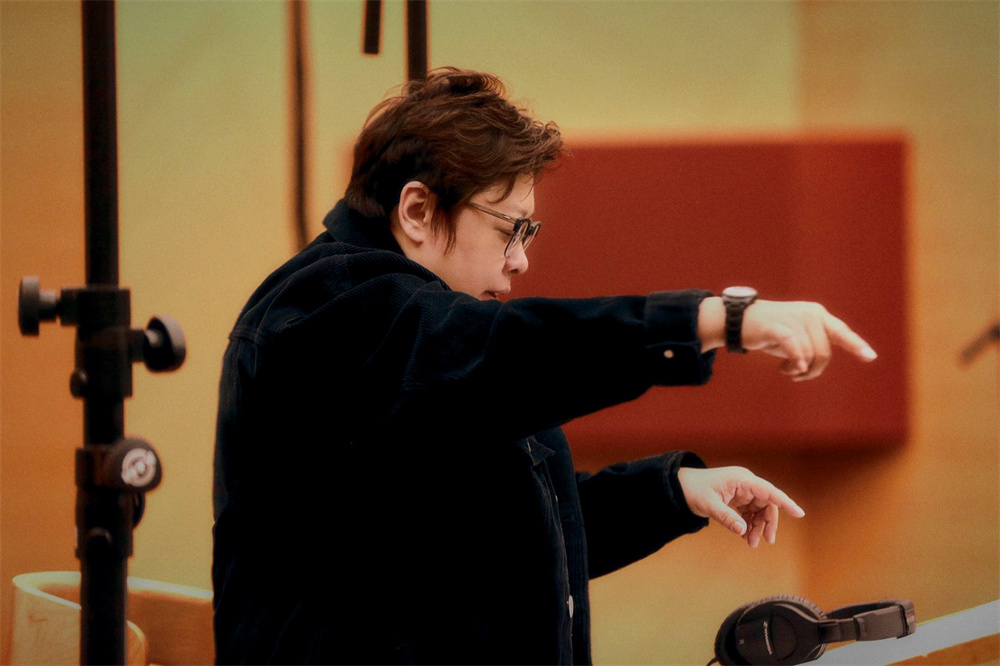
Conductor Han Hong
The Paper : When the classical album "Morning Fog" was released last year, many people from the film and television industry were invited. Did you already have the "ambition" to enter the film soundtrack?
Han Hong : It can be said that it is ambition, because I really love movies. But I belong to the kind of child from a poor family. The grandmother who brought me up is an old lady who sells cold drinks. The family is poor, so I don’t have much chance to go to the cinema, and there are few open-air movies in Beijing’s hutongs. So movies, to me, are fantastic and extravagant. After I grew up, I really took some film lessons and liked many great film directors.
So once this ambition has started, it will continue. But I will definitely not deliberately write some movies, this movie must move me. I think that in the future I will very likely write some works of unknown directors, as long as it moves me, as long as it makes me feel that I have a melody after watching this movie.
But now I really hope to have the opportunity to cooperate with director Ang Lee like my master Tan Dun. I really want to write "Bruce Lee", because this is also a story of the Chinese people and represents the indomitable spirit of the Chinese nation. I hope that director Ang Lee will have the opportunity to watch "Manjianghong" and notice me.
The Paper : The movie "Man Jianghong" talks about the spiritual power of literary works that can transcend personal life and death and time. You have also produced many highly popular works. How do you view the vitality of works in the era and the responsibility of creators? ?
Han Hong : In recent years, I have talked less, eaten less, and accumulated all the things I want to express, because I want to use music to show my strength and attitude. I think an artist must make contributions to the times, and be able to use music to relieve people's stress and fatigue. When facing difficulties, although music cannot help you out of danger, it can at least soothe your soul. If an artist can't use art to express his inner world and attitude towards the world, and can't use words, paintings, and music to give opinions to the world, what kind of artist is he?
In this era, the threshold for music works is actually low. Many ordinary children buy any software at random, and they can arrange their own music, record their own songs, and post them on the Internet. But I think that high-quality and high-level music cannot do without the attitude of striving for perfection in art works, which will also become my constant commitment throughout my life. I will definitely not make saliva music. This is my principle since I was a music major since I was a child. I have to be worthy of my identity as a singer and musician. Now I am a young film and television soundtrack worker, and I hope I can stick to it.
The Paper : For your highly popular works, have you ever been able to predict their popularity? Or do you think it was accidental?
Han Hong : As far as I am concerned, although I am a so-called mainstream singer, I sing "Qinghai-Tibet Plateau" and "Heavenly Road", everyone also thinks that I will be a so-called "national team". Personally, I don't think that's my label. Those songs are things that I want to sing about from the bottom of my heart. I grew up with my grandmother in Beijing. My grandmother was in Tibet. When she was 80 years old, she had the Qinghai-Tibet Railway. At that time, she smiled like a child. She said, can she take the train to see Beijing? I said of course, I said where do you want to go? She said she was going to Tiananmen Square. I was deeply moved by this sentence. So when I sang "Qinghai-Tibet Plateau" and "Road to Heaven", I really didn't sing soaring, but a kind of heartfelt representative of the simple Tibetan people. I am really grateful to the party and the government for building such a Qinghai-Tibet railway. I never sing what I don't want to sing, I think I have this persistence.
As for other songs, such as "Dawn", I just want to use music to tell a story, "The Sea" is a song of unswerving love, they became popular when they became popular, and I don't know why. I just insist on my own personal characteristics. I believe in my artistic intuition. I think that if a song touches me, it should also touch others. In fact, I failed in this regard, because my songs in the past two years have not been popular.
The Paper : In recent years, people have seen you more in the social news about public welfare. How much do public welfare and music account for in your life?
Han Hong : Music is my life, and public welfare is a matter between me and God. I have nothing but public welfare and music in my life. Now they have become my everything.
I feel that some children who cannot study can go to school, some grandparents who look down on the disease can solve their pain, and people who have no money to buy medicine can get medicine. These things really make me feel extremely happy and happy. satisfaction. But public welfare is not done by Han Hong alone. I don’t have that much energy alone. I am very proud of the comrades in the public welfare team.
Musically, I'm glad I tried more and more things without borders, I became a new rap guy XXXL, I tried classical music, released my own classical vinyl record, and this year will release another vinyl piano suite , and now I have the honor to score a film directed by Zhang Yimou.
I think I am a very lucky person, God really favors stupid children. Now I am very healthy, getting thinner and thinner, and my blood pressure has become stable. I prefer to be alone, listening to music and reading books quietly. My usual hobbies are drinking tea and writing calligraphy. In the future, I will continue to walk on the road of public welfare and music, breaking all boundaries and making the impossible possible.
